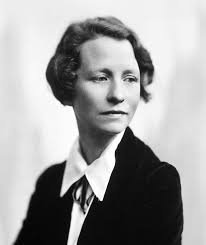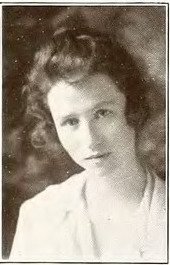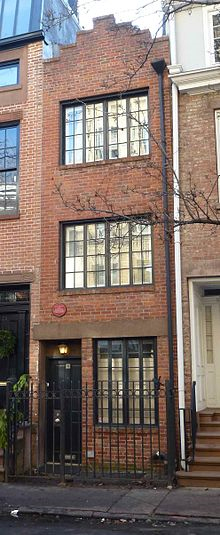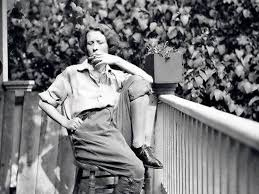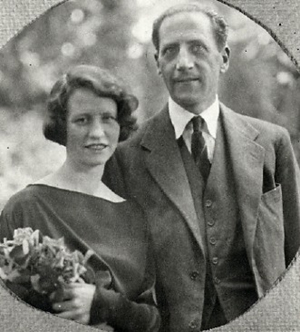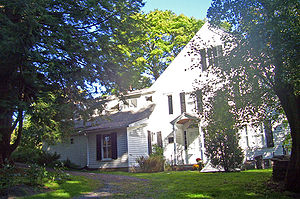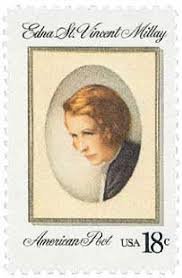EDNA ST. VINCENT MILLAY
Edna St. Vincent Millay was one of the most respected American poets of the 20th century. She was both a poet and a playwright and was well-known for her passionate readings and feminist views. Her diverse body of work included plays, articles, and stories, along with her poems.
She was born on February 22, 1892 in Rockland, Maine into a world with rigid expectations for women, who were expected to marry, have children, maintain a home, and keep their views to themselves. Millay flaunted every expectation and snubbed every convention and became one of the world’s most influential female poets to write in English. Millay would spend her life using her poetry to define a female aesthetic that espoused liberation, polyamory, and fierce self-definition. She was essentially the embodiment of the ‘New Woman.’
Millay, known to her family and friends as ‘Vincent,’ refused to be defined. She loved both women and men, frequently fell in and out of intense love and somehow maintained multiple relationships at the same time. Her poetic works challenged traditional boundaries and definitions, and controversially asserted that women not only had a right to pleasure but no obligation to fidelity.
EARLY CHILDHOOD
Edna Vincent Millay’s mother was a nurse and her father a schoolteacher. Her middle name came from St. Vincent’s Hospital in New York, where her uncle’s life had been saved just before her birth. Her parents divorced early on and her fiercely independent mother, with her 2 younger sisters, moved from town to town, living in poverty for a time and surviving various illnesses. Millay’s mother always traveled with a truck full of classic literature, such as Shakespeare and Milton, which she read to and had her children read. She also encouraged her daughters to write poems, stories, and songs.
Music was almost as important to Edna St. Vincent Millay as her poetry and throughout her life she delighted in playing and singing songs she had written and practicing classical pieces on the piano that she had learned in early childhood. She often invited other musicians to join her in a duet, trio, or quartet. She initially hoped to become a concert pianist, but because her teacher insisted her hands were too small, she directed her energies to writing songs and poetry.
Eventually, the family settled in a small house in Camden, Maine where Edna St. Vincent Millay would write the first of the poems that would bring her literary fame. She began developing her literary talents at Camden High school. From the age of 14 she was winning accolades for her poetry and was having her poetry published in a Children’s magazine, the Camden Herald, and others.
POETRY CONTEST WINNER
In 1912, her mother happened on an announcement of a poetry contest sponsored by ‘The Lyric Year,’ a proposed annual anthology. She entered her poem, ‘Renascence,’ in the contest. It portrays the transformation of a soul and that the dimensions of one’s life are determined by sympathy of heart and elevation of soul.
Her poem was considered by many the best submission (out of 10,000 entries), but when it was ultimately awarded fourth place, it created a scandal which brought Millay publicity. The first place winner felt hers was the best poem and the second prize winner offered her his prize money. Shortly after, a wealthy arts patron was impressed by her talent and offered to pay for Millay’s education at Vassar College.
VASSAR COLLEGE
Edna St. Vincent Millay entered Vassar College after taking preparatory courses at Barnard in the summer of 1913 at the age of 21.
The strict nature of the college made life difficult for her. The expectation was that its students would be refined and live according to their status as young ladies. This was the opposite of the liberal home life she had had that included smoking, drinking, playing gin rummy, and flirting with men.
It was at Vassar that she had relationships with many of her fellow students, including several relationships with women. As expected, she often broke rules and often found herself before the president for disciplinary action more than once.
NEW YORK CITY
Millay moved to New York City in 1917 after graduating from Vassar. She became a prominent social figure of New York City’s Greenwich Village at the time when it was becoming known as a bohemian writers' colony. She was well noted for her uninhibited lifestyle.
While living in New York City, Millay lived an openly bisexual lifestyle. During her stay in Greenwich Village, Millay learned to use her poetry in her feminist activism. She often went into detail about usually taboo topics, such as a wife leaving her husband in the middle of the night.
In 1919, she wrote what was considered to be an anti-war play ‘Aria da Capo. ‘ Since its first production it has remained a popular staple of the poetic drama.
She also wrote short stories for the magazine 'Ainslee’s,' under the pen name of Nancy Boyd. These stories mainly concerned writers and artists who had adopted the Greenwich Village attitudes of anti-materialism, approval of nude bathing, general flouting of conventions, and a Jazz Age spirit of mad gaiety. Her 1920 collection, ‘A Few Figs From Thistles,’ drew controversy for its exploration of female sexuality and feminism.
In 1920, her poems began to appear in 'Vanity Fair,' a magazine with an air of sophistication. An editor made note of the intensity with which she responded to every experience of life. Unfortunately, that intensity seemed to use up her physical resources. As the year went on, she suffered increasing fatigue and fell victim to a number of illnesses. Fortunately, she received an offer from the magazine to go to Europe on a regular salary and write as she pleased under either her own name or as Nancy Boyd.
PARIS
In 1921, Edna St. Vincent Millay went to Paris where she met and befriended sculptors, photographers, and journalists, many of whom she had affairs with.
She also got pregnant but returned to New England where her mother helped her induce an abortion using the herb alkanet. The fact that she was often ill and weak for much of the next four years may have been a result of the abortion.
MARRIAGE
In 1923, she married Eugen Boissevain, a wealthy Dutch businessman, who had nursed her through her various illnesses. Their marriage was open by consent and they both had other lovers throughout their 26 years of marriage.
Boissevain gave up his own pursuits to manage Millay’s literary career, setting up the readings and public appearances for which Millay grew famous. Bouissevain described himself as a feminist and took on the bulk of the domestic duties as well.
PULITZER PRIZE FOR POETRY
In the same year she was married, at the age of 31, Edna St. Vincent Millay became only the third woman to receive the Pulitzer Prize for Poetry for her collection ‘The Ballad of the Harp-Weaver,’ a haunting story of a poor mother and her son. The poem has so endured that nearly 80 years later, Johnny Cash would recite its chilling lines. It was dedicated to her mother.
STEEPLETOP
In 1925, Millay and Boissevain bought a large former blueberry farm near Austerlitz, NY, approximately 40 miles southeast of Albany, NY. They named it ‘Steepletop.’ On it they built a barn, a writing cabin, and a tennis court. Millay even grew her own vegetables in a small garden. She had wanted to Leave Manhattan because she felt it was too exciting there. Although it gave her lots of things to write about, she felt she needed to go away to write where it would be quiet.
At Steepletop, Millay created a body of work that included not only poetry and prose but a full-scale and very successful operatic libretto, 'The King’s Henchman,’ in 1927.
The life and death, growth and decay of nature served Edna St. Vincent Millay as an organizing principle both in her writing and in her life. Steepletop became her sanctuary. Boissevain considered that his mission in the marriage was to protect her from mundane tasks that would distract her from writing poetry.
ACCIDENT
In the summer of 1936, she was riding in a station wagon when the door suddenly swung open and she was hurled out and rolled for some distance down a rocky gully. The result was severely damaged nerves in her spine requiring frequent surgeries and hospitalizations, and resulting in neurotic fears, and the need for a daily dose of morphine. She lived the rest of her life as a partial invalid and in constant pain.
FASCISM
Despite her injuries, Millay was alarmed enough by the rise of fascism that she began to write against it. She had been a pacifist in WWI but in 1940 she advocated for the US to enter the war and she became an ardent supporter of the war effort. She worked with Writers’ War Board to create propaganda and poetry. But her reputation in poetry was damaged by her war works because they were considered largely hysterical and vituperative.
Millay wrote the 32 page poem called ‘The Murder of Lidice’ in 1942 about the destruction of the Czechoslovakian town of Lidice by the Nazis. It was used as the basis of the 1943 movie ‘Hitler’s Madman’ and was published by Harper& Brothers in 1942.
LAST YEARS
Sales of Edna St. Vincent Millay’s books were very good in the 1930s but her declining reputation, constant medical bills, and frequent demands from her mentally-ill sister, Kathleen, meant the she was in debt to her publisher. Unfortunately, she had also developed a passion for thoroughbred horse-racing as well and she ended up spending much of her income investing in a racing stable.
1942- Her husband lost everything because of the war.
1943-Millay was the 6th person and the second woman to be awarded the Frost Medal for her lifetime contribution to American Poetry.
1944–Millay suffered a nervous breakdown, apparently from the strain of composing hastily written pieces against deadlines, and was unable to write for a long time.
1949-Eugen Boissevain died of a stroke following the removal of a lung because of cancer. After his death, Millay suffered greatly, drank recklessly, and had to be hospitalized. She never stopped writing even towards the end of her life when she turned to drinking and became addicted to morphine to soothe her pain. Her last book of poems was written in the year before her death but did not appear until four years after her death.
1950-Edna St. Vincent Millay died of a heart attack at her home on October 19, 1950 at 58 years old. She was buried alongside her husband at Steepletop.
EDNA ST. VINCENT MILLAY-INFLUENCES
- Millay was the inspiration for several plays and musicals, including the biographical play,’ Words Like Fresh Skin,’ written by Megan Lohne and produced at Adelphi University.
- American composer, Margaret Bonds, arranged Six Songs on Poems by Edna St. Vincent Millay.
- 1971-In an All in the Family episode, ‘Judging Books by Covers,’ the character Archie Bunker erroneously refers to the poet as ‘Edna St. Louis Millay.’
- 1972- Millay’s poem ‘Conscientious Objector,’ was put to music by Mary Travers (of Peter, Paul, and Mary) on her album ‘Morning Glory’.
- 1975-In The Waltons episode,’The Woman,’ a female poet visiting the college attended by John Boy quotes Edna St. Vincent Millay reciting from ‘The First Fig': My candle burns at both ends/ It will not last the night/ But ah, my foes and oh my friends/ It gives a lovey light” It was she who coined the phrase, ‘My candle burns at both ends.’
- July 1981- the United States Postal Service issued an 18-cent stamp depicting Edna St. Vincent Millay.
- 2001-Nancy Milford compiled details of Millay’s life in the book titled, ‘Savage Beauty: The Life of Edna St. Vincent Millay.’ Milford also edited and wrote an introduction for a collection of Millay’s poems called ‘The Selected Poetry of Edna St. Vincent Millay.’
- 2015- Millay was named by Equality Forum as one of the ’31 Icons’ for the 2015 LGBT History Month.
EDNA ST. VINCENT MILLAY-LEGACY
Edna St. Vincent Millay was one of the most skillful writers of sonnets in the 20th century, much like her contemporary Robert Frost. They were both able to combine modern attitudes with traditional forms, creating a unique American poetry.
Millay portrayed frankly both hetero and homosexuality and successfully described new kinds of female experience and expression. As a humorist and satirist, she was able to express the postwar feelings of young people with their rebellion against tradition and their mode of freedom symbolized for many women by bobbed hair.
Her poem that included the line ‘My candle burns at both ends’ was taken up as catchphrase of the young people of that era and her poems often reflected on the desire to rebel against the constraints granted to women’s voices in literature and in life. She also was able to set a new and shocking precedent by acknowledging female sexuality as a viable literary subject.
Edna St. Vincent Millay was an extraordinary poet but her work has often been overshadowed by her unconventional reputation. She was called a party girl poet, a sexually adventurous bisexual, and a morphine addict. By the 1960s, the romantic poetry of Millay and the other women poets of her generation was largely ignored.
Eventually, however, the growing spread of feminism revived an interest in her writings and she has once again gained recognition as a highly gifted writer who upheld freedom and individualism, championed radical, idealistic humanist tenets, and held broad sympathies and a deep reverence for life.
FEMALE POETS TODAY
Any poetry today can be published online with ease, shared on social media, and read on mobile phones and has thus become increasingly popular with teenagers and millennials. A new generation of female poets has attracted millions of online followers and an increasingly diverse audience.
Poetry can help young people especially, because they are in a age when it is very difficult to articulate how they are feeling, especially with the advent of the Pandemic. The confusion and loneliness is so prevalent. Finding something in a poem that you may be feeling can be a liberating experience. The poems of Edna St. Vincent Millay were the foundation for the wide range of poems written by the women poets of today.
A NOTE ABOUT STEEPLETOP and the
EDNA ST. VINCENT MILLAY SOCIETY
Steepletop is now listed as a National Historic Landmark on the National Register of Historic Places and is now the home of the Edna St. Vincent Millay Society.
Steepletop is not currently open to visitors, but occasional events may be held to raise much-needed funds. If you are interested in learning more, please consider following the society on Facebook or check back on their Events page to keep up-to-date on happenings which may interest you.
THE POEMS OF EDNA ST. VINCENT MILLAY
Please click here for the Poetry Foundation website to peruse the poems of Edna St. Vincent Millay. You will not be disappointed!
Top of Edna St. Vincent Millay
"The Cleanest Clean You've Ever Seen."
by
ABC Oriental Rug & Carpet Cleaning Co.
130 Cecil Malone Drive Ithaca, NY 14850
607-272-1566
LINES FOR A GRAVE-STONE
read by George Jempty
Man alive, that mournst thy lot,
Desiring what thou hast not got,
Money, beauty, love, what not;
Deeming it blesseder to be
A rotted man, than live to see
So rude a sky as covers thee;
Deeming thyself of all unblest
And wretched souls the wretchedest,
Longing to die and be at rest;
Know: that however grim the fate
Which sent thee forth to meditate
Upon my enviable state,
Here lieth one who would resign
Gladly his lot, to shoulder thine.
Give me thy coat; get into mine.
TIME DOES NOT BRING RELIEF
read by Benjamin Mester
Time does not bring relief,you all have lied
Who told me time would ease me of my pain!
I miss him in the weeping of the rain;
I want him at the shrinking of the tide;
The old snows melt from every mountain-side,
And last year's leaves are smoke in every lane;
But last year's bitter loving must remain
Heaped on my heart, and my old thoughts abide!
There are a hundred places where I fear
To go --so with his memory they brim!
And entering with relief some quiet place
Where never fell his foot or shone his face
I say, 'There is no memory of him here!'
And so stand stricken, so remembering him!
LOVE IS NOT ALL
Read by Benjamin Mester
Love is not all: it is not meat nor drink
Nor slumber nor a roof against the rain,
Nor a floating spar to men that sink
And rise and sink and rise and sink again.
Love cannot fill the thickened lung with breath
Nor clean the blood, nor set the fractured bone;
Yet many a man is making friends with death
Even as I speak, for lack of love alone.
It well may be that in a difficult hour,
Pinned down by need and moaning for release
Or nagged by want past resolutions power,
I might be driven to sell your love for peace,
Or trade the memory of this night for food.
It may well be. I do not think I would.
I SHALL FORGET YOU PRESENTLY, MY DEAR
Read by Yvonne Perry
I shall forget you presently, my dear,
So make the most of this, your little day,
Your little month, your little half a year,
Ere I forget, or die, or move away,
And we are done forever; by and by
I shall forget you, as I said, but now,
If you entreat me with your loveliest lie
I will protest you with my favorite vow.
I would indeed that love were longer-lived,
And oaths were not so brittle as they are,
But so it is, and nature has contrived
To struggle on without a break thus far,—
Whether or not we find what we are seeking
Is idle, biologically speaking.
CHILDHOOD IS THE KINGDOM WHERE NOBODY DIES
Read by Edna St. Vincent Millay
Childhood is not from birth to a certain age and at a
certain age
The child is grown, and puts away childish things.
Childhood is the kingdom where nobody dies.
Nobody that matters, that is. Distant relatives of course
Die, whom one never has seen or has seen for an hour,
And they gave one candy in a pink-and-green stripéd bag, or a
jack-knife,
And went away, and cannot really be said to have lived at all.
And cats die. They lie on the floor and lash their tails,
And their reticent fur is suddenly all in motion
With fleas that one never knew were there,
Polished and brown, knowing all there is to know,
Trekking off into the living world.
You fetch a shoe-box, but it's much too small, because she won't
curl up now:
So you find a bigger box, and bury her in the yard, and weep.
But you do not wake up a month from then, two months
A year from then, two years, in the middle of the night
And weep, with your knuckles in your mouth, and say Oh, God!
Oh, God!
Childhood is the kingdom where nobody dies that matters,
—mothers and fathers don't die.
And if you have said, "For heaven's sake, must you always be
kissing a person?"
Or, "I do wish to gracious you'd stop tapping on the window with
your thimble!"
Tomorrow, or even the day after tomorrow if you're busy having
fun,
Is plenty of time to say, "I'm sorry, mother."
To be grown up is to sit at the table with people who have died,
who neither listen nor speak;
Who do not drink their tea, though they always said
Tea was such a comfort.
Run down into the cellar and bring up the last jar of raspberries;
they are not tempted.
Flatter them, ask them what was it they said exactly
That time, to the bishop, or to the overseer, or to Mrs. Mason;
They are not taken in.
Shout at them, get red in the face, rise,
Drag them up out of their chairs by their stiff shoulders and shake
them and yell at them;
They are not startled, they are not even embarrassed; they slide
back into their chairs.
Your tea is cold now.
You drink it standing up,
And leave the house.
PITY ME NOT
(read by Tom O'Bedlam)
Pity me not because the light of day
At close of day no longer walks the sky;
Pity me not for beauties passed away
From field and thicket as the year goes by;
Pity me not the waning of the moon,
Nor that the ebbing tide goes out to sea,
Nor that a man’s desire is hushed so soon,
And you no longer look with love on me.
This have I known always: Love is no more
Than the wide blossom which the wind assails,
Than the great tide that treads the shifting shore,
Strewing fresh wreckage gathered in the gales:
Pity me that the heart is slow to learn
What the swift mind beholds at every turn.
WHAT MY LIPS HAVE KISSED
What lips my lips have kissed, and where, and why,
I have forgotten, and what arms have lain
Under my head till morning; but the rain
Is full of ghosts tonight, that tap and sigh
Upon the glass and listen for reply,
And in my heart there stirs a quiet pain
For unremembered lads that not again
Will turn to me at midnight with a cry.
Thus in the winter stands the lonely tree,
Nor knows what birds have vanished one by one,
Yet knows its boughs more silent than before:
I cannot say what loves have come and gone,
I only know that summer sang in me
A little while, that in me sings no more.
ASHES OF LIFE
Read by Tom O'Bedlam
Love has gone and left me and the days are all alike;
Eat I must, and sleep I will, — and would that night were here!
But ah! — to lie awake and hear the slow hours strike!
Would that it were day again! — with twilight near!
Love has gone and left me and I don't know what to do;
This or that or what you will is all the same to me;
But all the things that I begin I leave before I'm through, —
There's little use in anything as far as I can see.
Love has gone and left me, — and the neighbors knock and borrow,
And life goes on forever like the gnawing of a mouse, —
And to-morrow and to-morrow and to-morrow and to-morrow
There's this little street and this little house.
